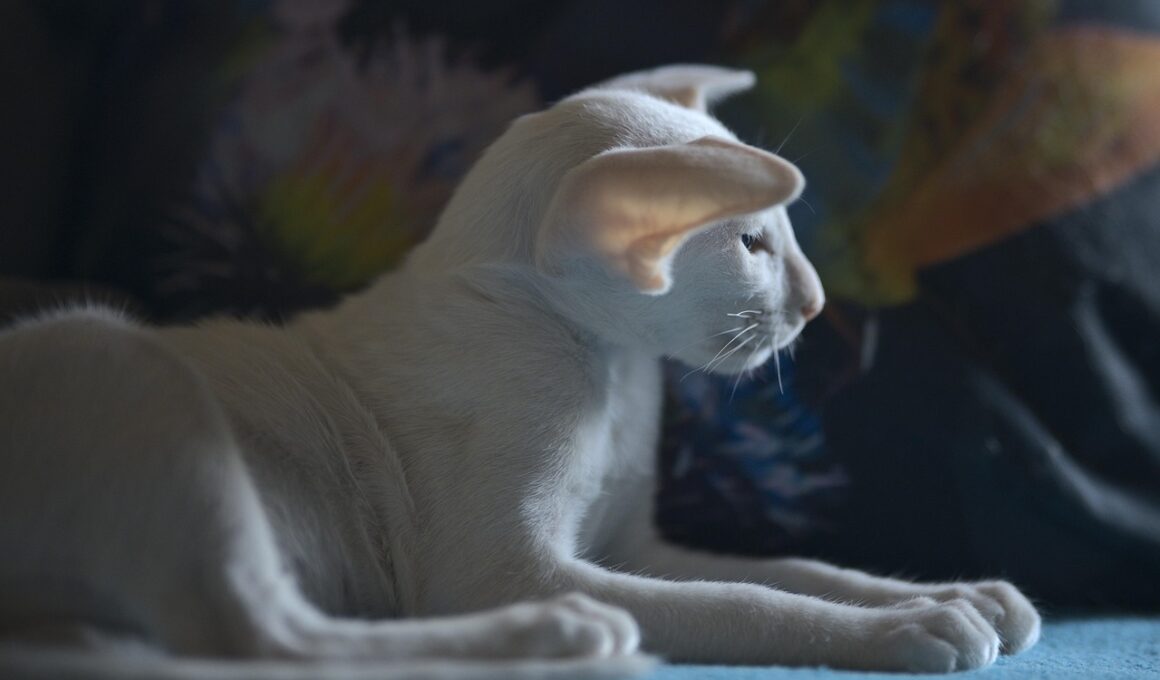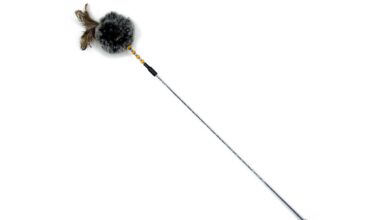Recognizing Signs of Illness in Your Oriental Shorthair Cat
Recognizing signs of illness in your Oriental Shorthair cat is essential for their health and well-being. These cats are known for their playful demeanor, but like any other breed, they can fall ill or develop health issues. It’s crucial to keep an eye on their behaviors and physical condition. One initial sign to monitor is their appetite. A sudden change, whether eating less or more than usual, could indicate underlying problems. Another notable aspect is their energy levels. If your cat becomes lethargic or shows disinterest in their favorite activities, it’s time to investigate further. Pay attention to their grooming habits, as Oriental Shorthairs are typically fastidious groomers. Changes in their grooming, such as neglecting their fur, might signal poor health. Additionally, look for changes in litter box habits. Excessive urination or reluctance to use the box can suggest urinary issues. If you observe any unusual behaviors, reaching out to your veterinarian is vital to ensure your feline friend receives prompt care. Regular health check-ups are also recommended to catch potential problems early.
Another important aspect of monitoring your Oriental Shorthair is their breathing. Signs of respiratory distress such as wheezing or coughing indicate that veterinary intervention is needed. Watch for other symptoms including nasal discharge or difficulty in breathing. If your cat appears to be in pain, this can often be hard to detect. Cats are notorious for hiding discomfort, so be vigilant for subtle signs like changes in posture or sudden aggression. Furthermore, examine your cat’s coat regularly. A lackluster, dull coat can reflect nutritional deficiencies or health concerns. Don’t forget to keep an eye on their eyes. If you notice any redness, excessive tearing, or cloudiness, it’s best to consult your vet. Oral health is another vital area. Bad breath, swelling, or excessive drooling may indicate dental disease. Regularly checking their teeth will help manage potential issues. Keep a close watch on your Oriental Shorthair’s weight as well. Sudden weight loss or gain is not typical and often requires immediate professional evaluation. All these signs help ensure a long, healthy life for your beloved pet.
Understanding Common Illnesses
Understanding common illnesses in Oriental Shorthair cats helps you recognize symptoms more precisely. Feline hyperthyroidism is a prevalent condition, especially in older cats. Symptoms often include increased appetite, weight loss, and hyperactivity. In this condition, a veterinarian can recommend blood tests and possible medication. Another common illness is diabetes mellitus, marked by excessive drinking or urination. Weight management and dietary changes are usually essential in managing this condition. Additionally, urinary tract infections may affect these beautiful cats, often presenting symptoms like frequent attempts to urinate or straining during urination. Confirming this condition requires veterinary diagnostics. Respiratory infections, which are quite common, may lead to coughing and nasal discharge during cold weather or exposure to pathogens. Vaccinations can be beneficial in preventing these infections. Dental disease is also a known issue among Oriental Shorthairs, with symptoms including bleeding gums and difficulty eating. Regular vet visits and at-home dental care can effectively manage oral health. Lastly, keep an eye out for skin disorders, like allergies, presenting with itching and hair loss that may require dietary adjustments or topical treatments.
Preventative care is essential for maintaining your Oriental Shorthair’s health. Regular veterinary check-ups provide an excellent opportunity to catch issues early and confirm routines involving vaccinations and parasite control. Being proactive about dental health ensures cleaner teeth and fewer health complications related to poor oral hygiene. Cats thrive on routine; therefore, maintaining a consistent diet helps avoid gastrointestinal upset. If you decide to introduce new foods, do so gradually to minimize digestive disturbances. Always ensure your cat stays hydrated, as water is crucial for their overall health. Encourage them to drink more water by providing fresh, filtered water and consider incorporating wet food into their diet. Mental stimulation is vital for an Oriental Shorthair’s happiness. Engage them with interactive toys or puzzle feeders to keep their mind sharp. Regular playtime not only helps with their mental health but keeps them physically fit too. Being observant of any behavioral shifts—whether stress, aggression, or withdrawal—allows for early detection of potential problems. Keeping a health journal detailing your cat’s behavior and habits can also aid in effectively communicating with your veterinarian.
Importance of Immediate Action
Implementing immediate actions when you notice any signs of illness in your Oriental Shorthair is crucial. The faster you respond, the better the outcome. Delay can lead to severe health complications, so don’t hesitate to take your pet to a veterinarian when something seems off. Make it a habit to observe their daily behaviors closely, as minor changes may indicate larger issues. Have a checklist of symptoms to evaluate like lethargy, unexpected aggression, or changes in eating habits, all of which require prompt attention. Assessing your cat’s overall condition regularly can help catch sickness early. It’s also essential to familiarize yourself with your local veterinary clinic’s emergency procedures. Knowing where to go and what to expect during a crisis can save precious time. If your Oriental Shorthair suffers any trauma or accidents, cardiac issues, or sudden breathing difficulties, seek veterinary assistance immediately. Remember that specialized care may sometimes be necessary; knowing a reliable emergency clinic is vital. Finally, regarding vaccinations and routine check-ups, proactive measures enable swift interventions and pave the way for preventive care significantly enhancing your Oriental Shorthair’s quality and longevity of life.
Holistic and alternative treatments can complement traditional veterinary advice but should not entirely replace it. Consulting with your veterinarian before trying any alternative remedies on your Oriental Shorthair is critical. Some holistic treatments may interact with prescribed medications or worsen pre-existing conditions. Natural supplements, such as omega-3 fatty acids, can promote healthy skin and coat when considering alternative options. Acupuncture may also relieve pain and improve mobility, particularly beneficial for older cats. Regularly evaluate their food and environmental factors to ensure they are balanced. Reduce stressors in your cat’s environment, as Oriental Shorthairs can be particularly sensitive to changes. Providing a calm, consistent space helps in their overall wellness. Some feline owners find that herbal remedies like valerian or chamomile can assist in relaxation, but be cautious and ensure they are safe for cats. Always stick to veterinarian advice regarding any suggested transitions to a new diet or supplement. Involving your veterinarian in your holistic choices keeps your Oriental Shorthair’s health on track, helping them live a longer, healthier life.
Maintaining a Healthy Lifestyle
Maintaining a healthy lifestyle for your Oriental Shorthair is fundamental to preventing illness. Structured routines that include balanced nutrition, regular exercise, and mental stimulation are important lifelong practices. Feeding your cat well means providing high-quality, species-appropriate food tailored to their age, weight, and health needs. Wet food can offer hydration benefits while saving them from dental issues associated with some dry foods. Pay attention to portion sizes to prevent obesity, which can lead to numerous health complications. Engage with them daily and allow them to participate in active play sessions to promote muscle strength and coordination. Providing various toys can keep them entertained and engaged mentally. Establish a secure environment free from potential hazards, whether that means avoiding toxic plants or ensuring secure windows and balconies during playtime. Additionally, consider creating safe zones where they can retreat to feel secure. Keep their living areas clean by providing clean litter regularly and regularly washing bedding. Social interaction is essential too. Oriental Shorthairs thrive on attention and companionship; spending time with them strengthens your bond while contributing to their overall emotional health. Always prioritize your cat’s environment to reflect a safe and loving home.
In conclusion, recognizing signs of illness in your Oriental Shorthair cat goes beyond simple observation. It’s about understanding their unique needs, behaviors, and the nuances of their health. Be proactive in monitoring changes to diet, behavior, and physical appearance, as these are key indicators of their overall health. Regular veterinary check-ups, vaccinations, and dental care are critical components of prevention. If you notice symptoms like lethargy, changes in grooming habits, or alterations in appetite, don’t hesitate to seek professional advice. Use this knowledge to empower your cat’s health insights while fostering a loving relationship built on trust and care. Empowering yourself with information improves your Oriental Shorthair’s quality of life and strengthens your bond. Additionally, consider exploring holistic approaches while ensuring that conventional veterinary advice remains at the forefront of your care practices. Fostering a healthy lifestyle full of enrichment, social interactions, and a loving environment is crucial as well. Ultimately, a happy, healthy Oriental Shorthair can be achieved when responsible caregiving meets attentiveness towards their needs, ensuring that your beloved cat lives a long, joyful life.


